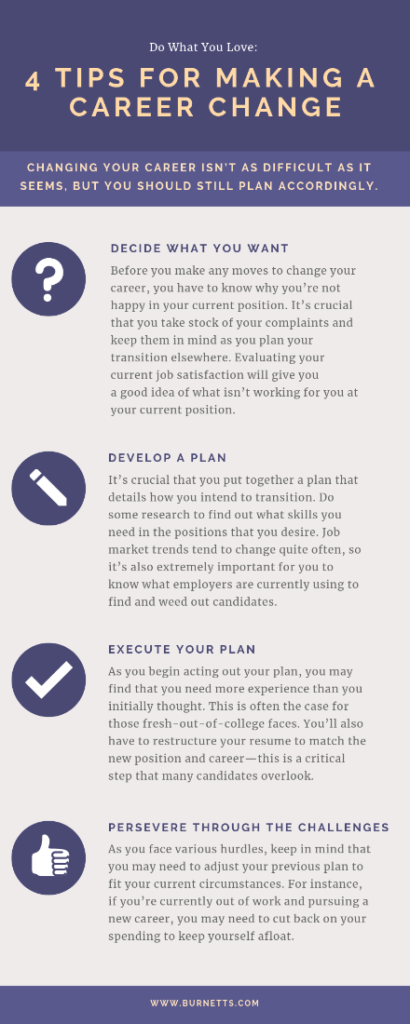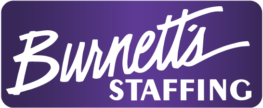
If you aren’t happy in your current career, it can feel like you’re trapped. You’re not alone in feeling this way. Whether someone desires a lifestyle change or they aren’t happy on their current career path, it’s not unusual for individuals to change careers several times throughout their lives.
These career change tips will walk you through the process and get you on the road to your ideal job.
Decide What You Want
Before you make any moves to change your career, you have to know why you’re not happy in your current position. It’s crucial that you take stock of your complaints and keep them in mind as you plan your transition elsewhere. Evaluating your current job satisfaction will give you a good idea of what isn’t working for you at your current position. This information will help you figure out what you need from a job to be happy.
For this step, you may want to ask yourself some of the following helpful questions:
- Why do I want to make this change?
- Why do I think a new career would make my life better?
- What are some potential downsides or risks of changing careers?
Once you know the motivations behind your desires, you need to take steps toward figuring out what career you truly want. Sometimes, it’s difficult to know exactly what you want until you experience it, so you might want to try a few new things to see what you enjoy. If you don’t know where to begin, it’s often helpful to make a note of the things you enjoy. Once you have a decent list, you want to narrow down what those interests have in common. The list could lead you to a field you might want to pursue. For instance, if you know you have an interest in reading and enjoy the written word, you may want to consider a career in journalism.
As you’re going about this process, you might also want to talk to individuals currently working in the field that interests you. Networking in this way can provide you with a few useful career change tips as well as educate you on what certain employers look for in an employee.
Develop a Plan
After deciding on a new career, it’s crucial that you put together a plan that details how you intend to transition. Do some research to find out what skills you need in the positions that you desire. Job market trends tend to change quite often, so it’s also extremely important for you to know what employers are currently using to find and weed out candidates.
Along with your career plan, you’re going to need to develop a financial plan. Those who want to make a career change often find themselves doing so while also continuing to work at their previous job. This way, they can still make ends meet while developing the solid foundation they need to start and build a new career.
If you’re struggling with the planning process and feel like you need professionals to assist you through the transition, be sure to reach out to an experienced staffing agency. They can help educate you on the current job market and even help you figure out the most effective ways to apply for positions.
Execute Your Plan
As you begin acting out your plan, you may find that you need more experience than you initially thought. Acquiring more professional experience is often the case for those who recently graduated from college. But, interestingly enough, many of those who have been working for an extended period of time still face the same barrier. This barrier is because the workforce changes rapidly, and it’s never quite the same one day to the next. Don’t get discouraged; large career changes don’t happen overnight, and you need to give yourself time to develop credibility. Keep in mind that you may need to go out of your way to gain the experience you need. However, this doesn’t mean that you or a recruiter can’t market yourself with the skills you already possess.
You will also want to restructure your resume to match the new position and career you are applying for—this is a critical step that many candidates overlook. Even if a new field values the same skills as your former one, you’ll need to display those traits differently. For instance, if you previously had a sales job and want to become a copywriter, you’ll want to highlight the skills that the two positions have in common. It may be beneficial to check out resume examples in your desired field to see how they differ from the one that you currently use. You also might want to show your resume to a staffing agency if you’re still unclear on how to make the necessary changes.
You should refer to your already established network. While certain individuals may not have any direct experience in the field you’re trying to pursue, they may be able to put you in touch with someone who does.
Persevere Through the Challenges
It’s important that you always remain committed to your career transition, even if you have a few setbacks along the way.
Here are some potential challenges that you may face:
- Lacking relative experience in the desired field
- Transferring your existing skills into a new field
- Employers questioning your professional experience and skill-set
- Competition for the same job
- Growing an establish network and utilizing industry resources
As you face various hurdles, keep in mind that you may need to adjust your previous plan to fit your current circumstances. For instance, if you’re currently out of work and pursuing a new career, you may want to consider temporary or contract work opportunities, which can help you get your foot in the door with new employers. Additionally, you may need to be practical in your approach and continue to work in your current position until you land a job in your new desired field.
Remember, that you’re building this new career from the ground up—which means that you may even need to begin in an entry-level position. Transferring into a new industry or role can be intimidating, but your willingness to adapt to new situations and learn new skills will be the difference between success and failure. It’s not where you start; it’s where you finish.


